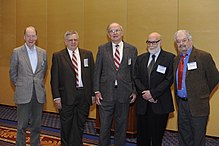François Englert
Baron François Englert (born November 6, 1932 in Etterbeek , Belgium ) is a Belgian theoretical physicist and university lecturer . On October 8, 2013, he and Peter Higgs were awarded the Nobel Prize in Physics .
youth
François Englert comes from a Jewish family and is a survivor of the Holocaust ; he was a so-called "hidden child" during World War II .
Working life
Englert graduated from the Université Libre de Bruxelles (ULB) with a degree in mechanical and electrical engineering in 1955, where he received his doctorate in physics in 1959. Then he was at Cornell University with Robert Brout until 1961 , most recently as an assistant professor. He returned to Brussels, where he became a professor. Robert Brout also joined him there as a professor. From 1980 they jointly headed the Theoretical Physics department. In 1998 he retired .
Independently of Peter Higgs (and Carl R. Hagen , Gerald Guralnik and TWB Kibble ) he discovered with Brout in 1964 the Higgs mechanism, named after the Higgs mechanism, of mass generation for calibration fields by breaking symmetry in analogy to solid state physics (Englert and Brout: Broken Symmetry and the Mass of Gauge Vector Mesons, In: Physical Review Letters, Volume 13, 1964, pp. 321-323.) Through a scalar field (Higgs field). This mechanism is now held responsible for the masses of the fundamental particles in the standard model of elementary particles. They assumed that the gauge theory with symmetry breaking would remain renormalizable . This was proven in the early 1970s by Gerardus' t Hooft and Martinus Veltman , who received the 1999 Nobel Prize in Physics for this .
He also worked on statistical mechanics , cosmology , string theory, and gravity theory. In 1978 he and Brout and Gunzig for The Causal Universe received first prize in the International Gravity Contest of the Gravity Research Foundation.
In 1997 he received the High Energy and Particle Physics Prize of the European Physical Society with Robert Brout and Peter Higgs and in 2004 the Wolf Prize with Brout and Higgs. In 1982 he received the Francqui Prize . In 2010 he was honored with the Sakurai Prize along with the other discoverers of the Higgs mechanism . In 2013 Englert, Peter Higgs and CERN were awarded the Prince of Asturias Prize . Finally, on July 8, 2013, Englert was raised to the Belgian nobility by Albert II with the title of baron. In addition, Thomson Reuters ranked Englert among the favorites for a Nobel Prize ( Thomson Reuters Citation Laureates ) in 2013 due to the number of his citations , which he was finally awarded together with Peter Higgs.
Web links
- Homepage
- François Englert - Facts. Nobel Media AB(English, short biography and other resources: photos, interview, autobiography, Nobel lecture).
- Tilman Plehn and Michael Krämer: The Higgs particle and its fathers . In: Physics Journal . tape 12 , no. 12 , 2013 ( pro-physik.de [PDF]).
- Thomas Bührke: Higgs particle and mechanism award-winning. In: Spektrum.de. October 8, 2013 .
- Nobelist Steven Weinberg Praises Professor Carl Hagen and Collaborators for Higgs Boson Theory. Rochester University, October 2007, archived from the original on October 14, 2013 .
Individual evidence
- ↑ On July 8, 2013, Englert was raised to the Belgian personal nobility by King Albert II with the title of baron: Adellijke in favor of: etaaamb.be (Dutch)
- ^ Nobelprize.org: The Nobel Prize in Physics 2013 , accessed October 8, 2013.
- ↑ Proof 1 (English)
- ↑ Proof 2 (Dutch)
- ↑ in the same volume of Physical Review Letters also the work of Higgs and Guralnik, Hagen, Kibble appeared. Englert and Brout even published a few weeks before Higgs.
- ↑ Fundamental Problems in Elementary Particle Physics . In: Proceedings of the 14th Solvay Conference, Brussels, 2. – 7. October 1967 . John Wiley, New York 1968, p. 18.
- ↑ Adellijke favor. Federale Overheidsdienst Buitenlandse Zaken, July 12, 2013, accessed on February 10, 2018 (Dutch).
- ↑ 2013 Predictions at Thomson Reuters. Archived from the original on September 27, 2013 ; Retrieved September 25, 2013 .
- ^ Message from the Nobel Prize Committee , accessed October 8, 2013.
| personal data | |
|---|---|
| SURNAME | Englert, François |
| BRIEF DESCRIPTION | Belgian theoretical physicist |
| DATE OF BIRTH | November 6, 1932 |
| PLACE OF BIRTH | Etterbeek , Belgium |

